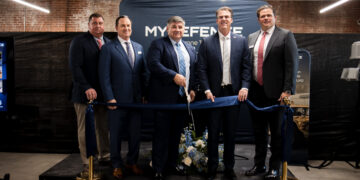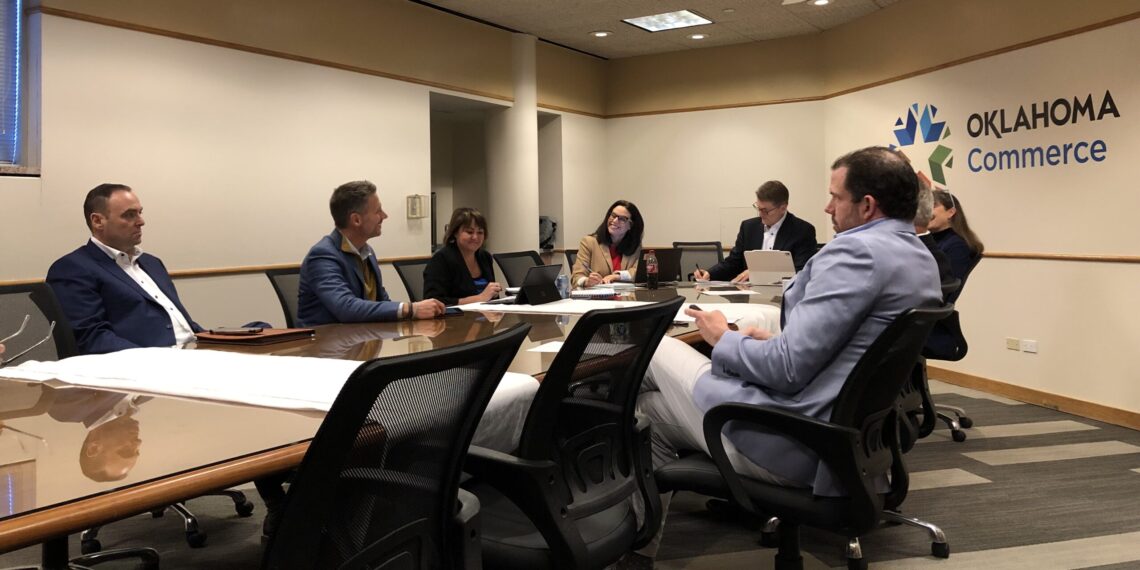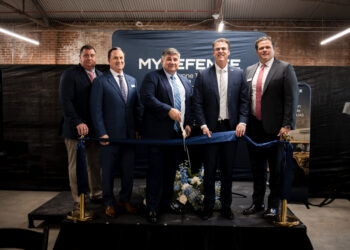OKLAHOMA CITY (OBV) – Newly-hired Oklahoma Workforce Commission CEO Kyla Guyette is looking forward to charting a new course to grow the state’s workforce and make Oklahoma a top business state in the nation.

Guyette participated in her first Workforce Commission meeting on Thursday.
The new CEO spoke about the path ahead and touched upon the preliminary work she has been doing to lead the Commission’s efforts toward revitalizing the state’s workforce infrastructure.
“We have been super busy in the last 30 days,” Guyette said.
Guyette said she has had one-on-one meetings with 50 state legislators.
“They were mostly positive, and the ones that weren’t positive, we had them champions [of workforce development] by the end of the conversation,” she said.
She said she also participated in budget hearings in both the State Senate and House of Representatives. The budget hearings involve funding the Workforce Commission as well as other state-sanctioned entities.
Guyette spoke with Oklahoma Business Voice after the monthly Workforce Commission meeting about her top priorities as CEO.
“I have a couple of really key things that need to happen. One, we’re trying to align our workforce system so that it makes the most sense and it can be the most efficient product that we’re producing. We want to make sure we are being effective with all of the dollars that we are spending. Are we getting a return on that investment? And how are we even spending the dollars? I really want to dig into what that investment looks like,” Guyette said.
Future strategy is especially important, Guyette said.
“We want to start being really strategic about the investments we make in workforce going forward, both from our training of workers having the availability of high-quality opportunities, and even what businesses we are recruiting into the state of Oklahoma,” Guyette said. “We want to do that in a really smart and strategic way. So, one of the biggest focuses is collecting all of that data and making sure that we are making really data-informed, smart decisions on what is working, what is not working and what has the best chance of being successful here in Oklahoma so that we can start building that pipeline of workers for those high-quality opportunities to hopefully have economic prosperity for everybody across the state.”
The Workforce Commission having a CEO is a major accomplishment, said Commission Vice Chairman Bryce Thompson.
“It’s our first accomplishment as a commission,” Thompson said. “We’re really excited about having her. It was important to have a fresh perspective on some things, and she definitely brings that.”
The Workforce Commission hired Guyette in December following a nationwide search. She’s already making an enormous difference, Thompson said.
“It feels like we’ve made more progress in the last six weeks than in the last six months. And that’s not because we weren’t working. It’s having somebody full time in the trenches working [on workforce],” he said.
As CEO, Guyette leads the Workforce Commission’s efforts to coordinate workforce development activities statewide, ensuring alignment with industry needs and creating robust opportunities for job seekers. Her work directly supports the goals outlined for the Workforce Commission by fostering collaboration between public and private sectors, educational institutions, and community organizations to address Oklahoma’s workforce challenges effectively.
Much of Guyette’s career has been focused on workforce development. She was the founding president of Workforce Mid-South, Inc. and served as the executive director of the Greater Memphis Local Workforce Development Board. Through those roles, she oversaw workforce development funding and initiatives in Western Tennessee’s four-county area.
Guyette also held leadership positions at ResCare Workforce Services and Tampa Bay WorkForce Alliance. Her most recent positions include CEO of The Work Lab and director of strategic partnerships at KRA Corporation.
Senate Bill 621, written by Sen. Adam Pugh, R-Edmond, and Rep. Brian Hill, R-Mustang, established the Oklahoma Workforce Commission when it was signed into law in June 2023.
The Workforce Commission works to coordinate the state’s workforce efforts. Their objective is to streamline workforce processes into a more efficient and effective system that will grow the economy and produce greater numbers of skilled workers. Hiring a CEO to coordinate workforce development strategies and initiatives was a primary Workforce Commission goal.
“The Oklahoma Workforce Commission was created to meet the needs of in-demand industries and grow our economy, while ensuring Oklahomans are equipped with the necessary skillset to be successful in these jobs,” Pugh said. “Since I have been in the Senate, one of my main priorities has been to enhance career readiness and connect education to industry so Oklahoma can remain competitive in a modern and rapidly changing economy. I was proud to author this legislation that aims to work toward this goal. I am excited about the announcement of the hiring of Kyla as CEO, and I look forward to working together to improve our state now and for future generations.”
SB 621 was born from research which revealed a workforce deficiency in Oklahoma. A State Chamber of Oklahoma and Business Roundtable joint survey found that 60 percent of Oklahoma’s business community said workforce shortages were the number one threat to business growth and expansion. Chad Warmington, president and CEO of The State Chamber of Oklahoma, and The State Chamber Research Foundation provided Gov. Kevin Stitt and legislators research data which showed that Oklahoma was 36,000 workers deficient in filling available jobs.
It was determined that a new, focused workforce management system was needed to grow the state’s workforce and fill the thousands upon thousands of available jobs.
The Workforce Commission is composed of nine members, each a representative from Oklahoma’s private business sector. It has been meeting since January, gathering information from state officials and leaders across the state’s industrial sectors. The Commission will rely on that information when creating workforce development strategies and administer and oversee funding allocated by the legislature for workforce development initiatives. The commission can contract with outside parties to achieve its goals.

















